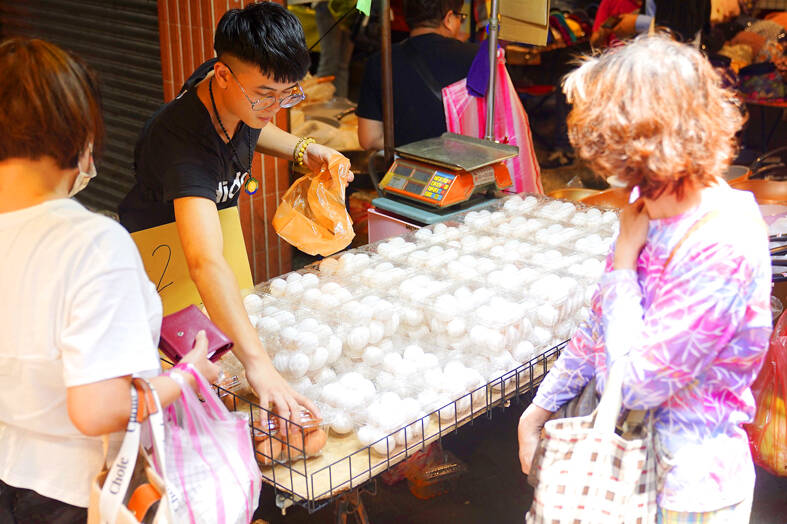The consumer price index (CPI) last month rose 2.35 percent from a year earlier, easing from a 2.43 percent increase in February and driven mainly by more expensive food and entertainment, the Directorate-General of Budget, Accounting and Statistics (DGBAS) said yesterday.
The latest CPI data suggest that inflationary pressure remained high, especially for frequently purchased items whose prices rose 6.12 percent, the agency’s monthly report showed.
“Inflationary pressures would remain tight in the near term and average people would feel the pinch more distinctly,” DGBAS official Tsao Chih-hung (曹志弘) said.

Photo: CNA
Food prices, the largest CPI component, grew 4.86 percent, as egg prices soared 26.52 percent, gaining by double percentage points for 17 months in a row, Tsao said.
Increased feeding costs pushed up egg prices, which are expected to gradually stabilize with egg imports, but the market needs time to adapt to the changes, he said.
Similar reasons contributed to a 5.75 percent increase in meat prices, he said.
Cooking oil and fruit prices rose 9.56 and 11.8 percent respectively, while the cost of dining out increased 4.08 percent after falling below the 4 percent mark in the previous two months, Tsao said.
Education and entertainment, another major CPI driver, gained 2.79 percent as recreational costs rose 6.46 percent after authorities further eased COVID-19 restrictions, the report said.
Shelter costs increased 2.3 percent as landlords raised rents, and as home repair and improvement became more expensive, it said.
Transportation and telecommunication costs declined 0.78 percent after international fuel prices fell 6.74 percent, it said.
Falling energy and raw material prices would help mitigate inflationary pressures this quarter, but rapid, steep easing is unlikely, Tsao said.
Core CPI expanded 2.55 percent, faster than the headline value after stripping volatile items, it said.
The producer price index (PPI), which measures price changes from a seller’s perspective, gained 0.05 percent, after prices for exports and imports softened whether measured by the US dollar or the local currency, it said.
For the first quarter, the CPI registered a 2.62 percent increase, while the PPI rose 3.4 percent, it said.

Sweeping policy changes under US Secretary of Health and Human Services Robert F. Kennedy Jr are having a chilling effect on vaccine makers as anti-vaccine rhetoric has turned into concrete changes in inoculation schedules and recommendations, investors and executives said. The administration of US President Donald Trump has in the past year upended vaccine recommendations, with the country last month ending its longstanding guidance that all children receive inoculations against flu, hepatitis A and other diseases. The unprecedented changes have led to diminished vaccine usage, hurt the investment case for some biotechs, and created a drag that would likely dent revenues and

Global semiconductor stocks advanced yesterday, as comments by Nvidia Corp chief executive officer Jensen Huang (黃仁勳) at Davos, Switzerland, helped reinforce investor enthusiasm for artificial intelligence (AI). Samsung Electronics Co gained as much as 5 percent to an all-time high, helping drive South Korea’s benchmark KOSPI above 5,000 for the first time. That came after the Philadelphia Semiconductor Index rose more than 3 percent to a fresh record on Wednesday, with a boost from Nvidia. The gains came amid broad risk-on trade after US President Donald Trump withdrew his threat of tariffs on some European nations over backing for Greenland. Huang further

Macronix International Co (旺宏), the world’s biggest NOR flash memory supplier, yesterday said it would spend NT$22 billion (US$699.1 million) on capacity expansion this year to increase its production of mid-to-low-density memory chips as the world’s major memorychip suppliers are phasing out the market. The company said its planned capital expenditures are about 11 times higher than the NT$1.8 billion it spent on new facilities and equipment last year. A majority of this year’s outlay would be allocated to step up capacity of multi-level cell (MLC) NAND flash memory chips, which are used in embedded multimedia cards (eMMC), a managed

CULPRITS: Factors that affected the slip included falling global crude oil prices, wait-and-see consumer attitudes due to US tariffs and a different Lunar New Year holiday schedule Taiwan’s retail sales ended a nine-year growth streak last year, slipping 0.2 percent from a year earlier as uncertainty over US tariff policies affected demand for durable goods, data released on Friday by the Ministry of Economic Affairs showed. Last year’s retail sales totaled NT$4.84 trillion (US$153.27 billion), down about NT$9.5 billion, or 0.2 percent, from 2024. Despite the decline, the figure was still the second-highest annual sales total on record. Ministry statistics department deputy head Chen Yu-fang (陳玉芳) said sales of cars, motorcycles and related products, which accounted for 17.4 percent of total retail rales last year, fell NT$68.1 billion, or